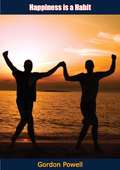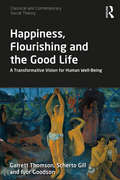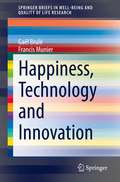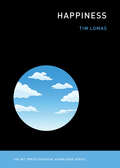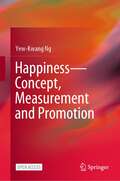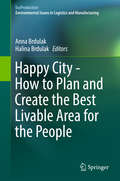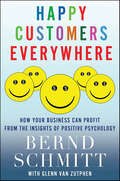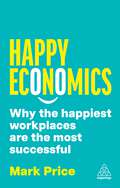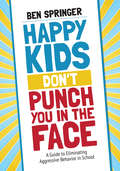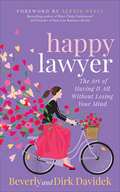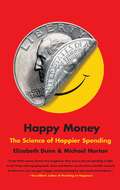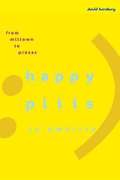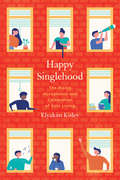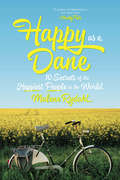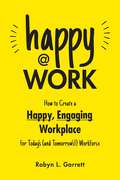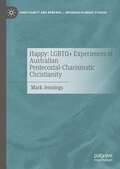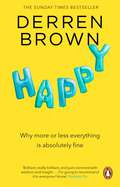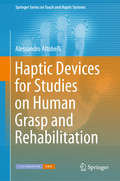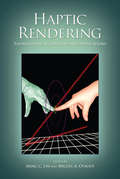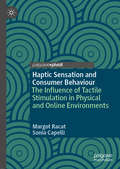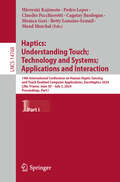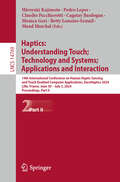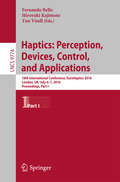- Table View
- List View
Happiness is a Habit
by Gordon PowellThe most dominating goal of the average person today is to find happiness.Clergymen, doctors, sociologists and specialists in human nature will generally agree that the above statement accurately reflects the times. A famous author-minister—Gordon Powell—has written an inspirational book based on the above statement.Gordon Powell was minister of St. Stephen’s Presbyterian Church in Sydney, Australia. One unique aspect of this church was the lunch-hour service every Wednesday for professional and business people. This service was broadcast by eighteen radio stations, in four states of the continent, to an area covering ninety per cent of the population. It was also shown on television in the areas of Sydney, Melbourne and Adelaide. St. Stephen’s claimed the largest attendance of any Protestant church in Australia.Another spiritually creative feature of Gordon Powell’s ministry is the “Faith Builder” cards, over a million of which have been printed and distributed. The cards contain both a scriptural guide for living, plus a modern interpretation or adaptation of the Biblical wisdom. Each of the twelve chapters in Happiness Is A Habit ends with a “Faith Builder,” and these “Faith Builders” are printed again in a separate section at the end of the book in case you should want to clip them out for personal use.Happiness is a Habit digs into the heart of today’s complexities, offering helpful guidance and spiritual nourishment to the reader.“A sensible philosophy of life, based on the teaching of the Sermon on the Mount, and teaching that the secret of happiness lies in right thinking and in the application of a positive faith to everyday life.”—The Times Literary Supplement
Happiness, Flourishing and the Good Life: A Transformative Vision for Human Well-Being (Classical and Contemporary Social Theory)
by Garrett Thomson Ivor Goodson Scherto GillWell-being studies is an exciting and relatively new multi-disciplinary field, with data being gathered from different domains in order to improve social policies. In its reliance on a truncated account of well-being based implicitly on neoclassical economic assumptions, however, the field is deeply flawed. Departing from reductive accounts of well-being that exclude the normative or evaluative aspect of the concept and so impoverish the attendant conception of human life, this book offers a new perspective on what counts normatively as being well. In reconceptualising well-being holistically, it presents a fresh vista on how we can consider the meanings of human life in a manner that also serves as a source of constructive social critique. The book thus undertakes to invert the usual approach to the social sciences, in which the research is required to be objective in terms of methodology and subjective with regard to evaluative claims. Instead, the authors are deliberately objective about values in order to be more open to the subjectivities of human life. Happiness, Flourishing and the Good Life thus seeks to move away from economic considerations’ domination of all social spaces in order to understand the possibilities of well-being beyond instrumentalisation or commodification. A radical new approach to the human well-being, this book will appeal to philosophers, social theorists and political scientists and all who are interested in human happiness.
Happiness, Technology and Innovation (SpringerBriefs in Well-Being and Quality of Life Research)
by Gaël Brulé Francis MunierThis book asks what kind of impacts innovations and technology have on subjective well-being and happiness. It presents the state of the art both in terms of results and theoretical questioning on these topics. It proposes a new concept: innovation that leads to greater happiness, and highlights new research in this area. In so doing, it addresses a less researched area in the field of well-being research. The authors state that notwithstanding the indisputable positive contributions of innovation and technology, there are also drawbacks, which need equal attention in research. This book is of interest to students and researchers of quality of life and well-being, as well as innovation research.
Happiness: A Cross-cultural Lexicon Of Well-being (The MIT Press Essential Knowledge series)
by Tim LomasA concise and engaging exploration of how we understand happiness.What does it mean to feel happiness? As a state of mind, it&’s elusive. As a concept—despite the plethora of pop psychology books on the subject—it&’s poorly understood. In this volume in the MIT Press Essential Knowledge series, psychologist Tim Lomas offers a concise and engaging overview of our current understanding of happiness. Lomas explains that although the field of positive psychology, which focuses on happiness, emerged only in the last twenty-five years, interest in the meaning of happiness goes back several millennia. Drawing on a variety of disciplines, from philosophy and sociology to economics and anthropology, Lomas offers an expansive vision of what happiness means, exploring a significant range of experiential territory. After considering such related concepts as wellbeing and flourishing, Lomas traces ideas of happiness from the ancient Buddhist notions of sukha and nirvana through Aristotle&’s distinction between hedonic and eudaemonic happiness to today&’s therapeutic and scientific approaches. He discusses current academic perspectives, looking at the breadth of happiness research across disciplines; examines the mechanics of happiness—the physiological, psychological, phenomenological, and sociocultural processes that make up happiness; explores the factors that influence happiness, both individual and social; and discusses the cultivation of happiness.
Happiness—Concept, Measurement and Promotion
by Yew-Kwang NgThis open access book defines happiness intuitively and explores several common conceptual mistakes with regard to happiness. It then moves on to address topical issues including, but not limited to, whether money can buy you happiness, why happiness is ultimately the only thing of intrinsic value, and the various factors important for happiness. It also presents a more reliable and interpersonally comparable method for measuring happiness and discusses twelve factors, from A to L, that are crucial for individual happiness: attitude, balance, confidence, dignity, engagement, family/friends, gratitude, health, ideals, joyfulness, kindness and love. Further, it examines important public policy considerations, taking into account recent advances in economics, the environmental sciences, and happiness studies. Novel issues discussed include: an environmentally responsible happy nation index to supplement GDP, the East Asian happiness gap, a case for stimulating pleasure centres of the brain, and an argument for higher public spending.
Happy City - How to Plan and Create the Best Livable Area for the People
by Anna Brdulak Halina BrdulakThis book presents multi-sector practical cases based on the author's own research. It also includes the best practice, which could serve as a benchmark for the creation of smart cities. The global urbanisation index, i. e. , the ratio of city dwellers to the total population, has been steadily increasing in recent years. It is highest in the Americas, followed by Europe, Asia and Africa. The city of the future will combine the intelligent use of IT systems with the potential of institutions, companies and committed, creative inhabitants. The administrative boundaries of today's cities put certain constraints on their further growth, but in the future these boundaries will no longer be as relevant. Cities in Europe face the challenge of reconciling sustainable urban development and competitiveness - a challenge that will likely influence issues of urban quality such as the economy, culture, social and environmental conditions, changing a given city's profile as well as urban quality in terms of its composition and characteristics.
Happy Customers Everywhere: How Your Business Can Profit from the Insights of Positive Psychology
by Bernd Schmitt Glenn van ZutphenEvery business knows that the best customer is a happy customer. They return again and again, bring their friends and family, and deliver tons of free advertising via word of mouth and social media. But in order to grow that loyal base, you must be keenly aware of your customers' needs and preferences. Drawing on the latest research in the exploding field of positive psychology, Columbia Business School professor Bernd Schmitt offers three unique approaches any business can use to turning a casual customer into a committed fan:• The Feel-Good Method: Use the experience of pleasure and positive emotion to hook new customers, and watch those feel-good moments transform an impulsive buyer into a committed loyalist.• The Values-and-Meaning Method: Attract passionate customers by appealing to their core values, like being socially responsible, protecting the environment, or living a simple life • The Engagement Method: Get customers to notice a unique or limited offer, immerse them in the experience, and have them share it with friends and family.Schmitt shows marketers, brand managers, and entrepreneurs how to design an authentic and successful campaign that will reach, grow, and sustain a devoted base of customers.
Happy Economics: Why the Happiest Workplaces are the Most Successful
by Mark PriceHappiness at work matters. But what does happiness mean? How can managers measure it and have more of it? And what happens to organizations when they get happiness right? Ask anyone. Happiness and wellbeing are important for all organizations, because they undeniably lead to economic happiness and financial success for everyone involved. But how does happiness drive growth and how should business leaders develop happier companies? In Happy Economics, business expert Mark Price clearly demonstrates why the opportunity represented by happiness is huge for businesses. Using real-world examples of those organizations who have got it right, he explains what happy economics is, why happiness metrics matter, connects high happiness with high performance, explores how to create happy teams and creating a corporate happiness plan that can be used by any business.
Happy Kids Don't Punch You in the Face: A Guide to Eliminating Aggressive Behavior in School
by Ben SpringerTake a positive approach to behavior intervention for results that work—and last! When there’s a nuclear meltdown happening in your classroom, this book is your trusted guide on what to do in the heat of the moment, and how you can prevent future incidents. These field-tested strategies integrate principles of behavioral intervention with the best practices of positive psychology. Inside you’ll find: Ready-to-use tools and guidelines Practical guidance developed from the author’s extensive experience training educators Solutions that work now and support each student’s future well-being A deliberate focus at the classroom, building, and system level
Happy Kids Don't Punch You in the Face: A Guide to Eliminating Aggressive Behavior in School
by Ben SpringerTake a positive approach to behavior intervention for results that work—and last! When there’s a nuclear meltdown happening in your classroom, this book is your trusted guide on what to do in the heat of the moment, and how you can prevent future incidents. These field-tested strategies integrate principles of behavioral intervention with the best practices of positive psychology. Inside you’ll find: Ready-to-use tools and guidelines Practical guidance developed from the author’s extensive experience training educators Solutions that work now and support each student’s future well-being A deliberate focus at the classroom, building, and system level
Happy Lawyer: The Art of Having It All Without Losing Your Mind
by Beverly Davidek Dirk DavidekHow you can make use of your law degree—without making yourself miserable. When they enter the field, lawyers seem to have it made—with a high-salary, high-status profession that should set them up for life. Yet, even when they seem to have it all, they often start to feel like something&’s off. Their careers have become horribly soul-sucking. They&’re managing their lives, sort of—but they feel duped. Trapped. Their &“good job&” is affecting their health and relationships—and they&’re just trying to keep all the plates spinning. Here&’s the good news: Beverly Davidek has been there, and in this book she and husband Dirk show how you can find a job that allows for happiness, satisfaction, and peace of mind. If you&’re still struggling to find a way to provide for your family without losing yourself, this book is for you. Part Ask and It Is Given and part What Color Is Your Parachute? (but written specifically for lawyers), Happy Lawyer gives you the tools you need to get unstuck in your career and start living your dream.
Happy Money: The Science of Happier Spending
by Michael Norton Elizabeth DunnTwo professors combine their fascinating and cutting-edge research in behavioral science to explain how money can buy happiness--if you follow five core principles of smart spending.Most people recognize that they need professional advice on how to earn, save, and invest their money. When it comes to spending that money, most people just follow their intuitions. But scientific research shows that those intuitions are often wrong.Happy Money offers a tour of research on the science of spending, explaining how you can get more happiness for your money. Authors Elizabeth Dunn and Michael Norton have outlined five principles--from choosing experiences over stuff to spending money on others--to guide not only individuals looking for financial security, but also companies seeking to create happier employees and provide "happier products" to their customers. Dunn and Norton show how companies from Google to Pepsi to Charmin have put these ideas into action.Along the way, Dunn and Norton explore fascinating research that reveals that luxury cars often provide no more pleasure than economy models, that commercials can actually enhance the enjoyment of watching television, and that residents of many cities frequently miss out on inexpensive pleasures in their hometowns. By the end of this "lively and engaging book" (Dan Gilbert, author of Stumbling on Happiness), you'll be asking yourself one simple question every time you reach for your wallet: Am I getting the biggest happiness bang for my buck?
Happy Pills In America: From Miltown To Prozac
by David HerzbergValium. Paxil. Prozac. Prescribed by the millions each year, these medications have been hailed as wonder drugs and vilified as numbing and addictive crutches. Where did this "blockbuster drug" phenomenon come from? What factors led to the mass acceptance of tranquilizers and antidepressants? And how has their widespread use affected American culture? David Herzberg addresses these questions by tracing the rise of psychiatric medicines, from Miltown in the 1950s to Valium in the 1970s to Prozac in the 1990s. The result is more than a story of doctors and patients. From bare-knuckled marketing campaigns to political activism by feminists and antidrug warriors, the fate of psychopharmacology has been intimately wrapped up in the broader currents of modern American history. Beginning with the emergence of a medical marketplace for psychoactive drugs in the postwar consumer culture, Herzberg traces how "happy pills" became embroiled in Cold War gender battles and the explosive politics of the "war against drugs"—and how feminists brought the two issues together in a dramatic campaign against Valium addiction in the 1970s. A final look at antidepressants shows that even the Prozac phenomenon owed as much to commerce and culture as to scientific wizardry. With a barrage of "ask your doctor about" advertisements competing for attention with shocking news of drug company malfeasance, Happy Pills is an invaluable look at how the commercialization of medicine has transformed American culture since the end of World War II.
Happy Singlehood: The Rising Acceptance and Celebration of Solo Living
by Elyakim KislevHappy Singlehood charts a way forward for singles to live life on their terms, and shows how everyone—single or coupled—can benefit from accepting solo living. Based on personal interviews, quantitative analysis, and extensive review of singles’ writings and literature, author Elyakim Kislev uncovers groundbreaking insights on how unmarried people create satisfying lives in a world where social structures and policies are still designed to favor marriage. In this carefully crafted book, Kislev investigates how singles nurture social networks, create innovative communities, and effectively deal with discrimination. Happy Singlehood challenges readers to rethink how single people organize social and familial ties in new ways, and illuminates how educators, policymakers, and urban planners should cater to their needs.
Happy as a Dane: 10 Secrets of the Happiest People in the World
by Malene RydahlThis international bestseller shows why the Danes are happy and how we can be, too. For decades Denmark has ranked at the top of the world’s happiness surveys. How is it that these 5.6 million Danes are so content when they live in a country that is dark and cold nine months of the year and where income taxes are at almost 60 percent? At a time when talk across the Western world is focused on unemployment woes, government overreach, and anti-taxation lobbies, our Danish counterparts seem to breathe a healthier and fresher air. Interweaving anecdotes and research, Malene Rydahl explores how the values of trust, education, and a healthy work-life balance with purpose—to name just a few—contribute to a “happy” population. From eye-opening stories about open-air vegetable stands to babies safely left unattended while parents have coffee, to very generous paternity leave policies, Rydahl provides tips that we can all apply to our daily lives regardless of where we live.
Happy at Work: How to Create a Happy, Engaging Workplace for Today's (and Tomorrow's!) Workforce
by Robyn L. GarrettRevamp your workplace culture with these 100 accessible strategies for creating a supportive, flexible, productive, and happy work environment, perfect for managers, human resource representatives, and other workplace leaders.It&’s time to update your workplace culture! One of the most important reasons people today choose to stay—or leave—a job is the culture of the company. As people become more socially conscious; focus more on wellness, self-care, and work-life balance; and seek jobs where they feel a real connection, it&’s more important than ever to think about the elements of a job between the work itself. But how do you create a culture that people enjoy while staying productive and successful? In Happy at Work, you&’ll first learn a bit more about why a happy workplace is so important and how it can benefit both the individual employees and the company as a whole. Then, it&’s time to take action. Considering new trends in the workplace and the ever-changing workplace, this book provides 100 strategies for improving your work environment. You&’ll learn to tackle big topics that are important to people today, such as: -Providing fair compensation and benefits -Giving your employees real recognition and rewards -Respecting diverse needs -Cultivating a healthy work-life balance -And much more! This book not only provides great ideas for changing your workplace for the better, but also provides clear guidance on how to make those changes happen. Whether you&’re a new manager, a long-time HR representative, or another leader ready to make a change, Happy at Work gives you everything you need to know to revitalize your workplace and make you (and your employees) happy to come to work every single day.
Happy: LGBTQ+ Experiences of Australian Pentecostal-Charismatic Christianity (Christianity and Renewal - Interdisciplinary Studies)
by Mark JenningsThis book relates the unique experiences of Lesbian, Gay, Bisexual, Transgender and Queer/Questioning (LGBTQ+) people in Australian Pentecostal-Charismatic Christian churches. Grounded in the theoretical contributions of Michel Foucault, Judith Butler, Lewis Coser, and others, the book exposes the discursive ‘battleground’ over the ‘truth’ of sex which underlies the participants’ stories. These rich and complex narratives reveal the stakes of this conflict, manifested in ‘the line’ – a barrier restricting out LGBTQ+ people from full participation in ministry and service. Although some participants related stories of supportive—if typically conservative—congregations where they felt able to live out an authentic, integrated faith, others found they could only leave their formerly close and supportive communities behind, ‘counter-rejecting’ the churches and often the faith that they felt had rejected them.
Happy: Why More or Less Everything is Absolutely Fine
by Derren BrownThe Sunday Times Bestseller'Really brilliant and just crammed with wisdom and insight. It will genuinely make a difference to me and the way I think about myself.' Stephen Fry___Everyone says they want to be happy. But that's much more easily said than done. What does being happy actually mean? And how do you even know when you feel it?In Happy Derren Brown explores changing concepts of happiness - from the surprisingly modern wisdom of the Stoics and Epicureans in classical times right up until today, when the self-help industry has attempted to claim happiness as its own. He shows how many of self-help's suggested routes to happiness and success - such as positive thinking, self-belief and setting goals - can be disastrous to follow and, indeed, actually cause anxiety.Happy aims to reclaim happiness and to enable us to appreciate the good things in life, in all their transient glory. By taking control of the stories we tell ourselves, by remembering that 'everything's fine' even when it might not feel that way, we can allow ourselves to flourish and to live more happily.___What readers are saying: ***** 'Immensely positive and life-affirming'***** 'This is the blue print to a good life'***** 'Thought provoking and potentially life-changing.'
Haptic Devices for Studies on Human Grasp and Rehabilitation
by Alessandro AltobelliThis book presents a new set of devices for accurate investigation of human finger stiffness and force distribution in grasping tasks. The ambitious goal of this research is twofold, the first is to advance the state of the art on human strategies in manipulation tasks and provide tools to assess rehabilitation procedure and the second is to investigate human strategies for impedance control that can be used for human robot interaction and control of myoelectric prosthesis. Part one describes two types of systems that are able to achieve a complete set of measurements on force distribution and contact point locations. The effectiveness of these devices in grasp analysis is also experimentally demonstrated and applications to neuroscientific studies are discussed. In part two, the devices are exploited in two different studies to investigate stiffness regulation principles in humans. The first study provides evidence on the existence of coordinated stiffening patterns in the fingers of human hands and establishes initial steps towards a real-time and effective modelling of finger stiffness in tripod grasp. The second study presents experimental findings on how humans modulate their hand stiffness whilst grasping objects of varying levels of compliance. The overall results give solid evidence on the validity and utility of the proposed devices to investigate human grasp properties. The underlying motor control principles that are exploited by humans in the achievement of a reliable and robust grasp can potentially be integrated into the control framework of robotic or prosthetic hands to achieve a similar interaction performance.
Haptic Rendering: Foundations, Algorithms, and Applications
by Ming C. Lin Miguel A. OtaduyFor a long time, human beings have dreamed of a virtual world where it is possible to interact with synthetic entities as if they were real. It has been shown that the ability to touch virtual objects increases the sense of presence in virtual environments. This book provides an authoritative overview of state-of-theart haptic rendering algorithms
Haptic Sensation and Consumer Behaviour: The Influence of Tactile Stimulation in Physical and Online Environments
by Margot Racat Sonia CapelliThis book offers an overview of haptic sensation and its influence on consumers’ behaviour, especially in dual and mediated environments where products are accessible through an interface. After almost three decades, marketers have reached a critical understanding of the importance of consumers’ senses to the processing of brands, products and advertising information. Since the development of the internet, however, there have been questions as to how markets and consumers can reach out to products in different environments. Recent advances in technologies allow sensations to render or stimulate physical sensations similar to the handling of the same product. These emerging possibilities question the way consumers are and will be able to feel a product according to the reality it relies on. The book begins by defining and discussing haptic consumption, before introducing the challenge of appealing to consumers’ senses in the digital age and examining how marketing managers have overcome this tangible barrier to date. The authors go on to further investigate the role of interfaces in rendering tactile sensations, with a particular focus on technological innovations. Finally, the book presents the authors’ original research in the field and offers a prospective vision of consumption for the coming years.
Haptics: 14th International Conference on Human Haptic Sensing and Touch Enabled Computer Applications, EuroHaptics 2024, Lille, France, June 30 – July 3, 2024, Proceedings, Part I (Lecture Notes in Computer Science #14768)
by Claudio Pacchierotti Hiroyuki Kajimoto Pedro Lopes Maud Marchal Cagatay Basdogan Monica Gori Betty Lemaire-SemailThe two-volume set LNCS 14768 + 14769 constitutes the refereed proceedings of the 14th International Conference on Human Haptic Sensing and Touch Enabled Computer Applications, EuroHaptics 2024, held in Lille, France, during June 30 – July 3, 2024. The 81 full papers presented were carefully reviewed and selected from 142 submissions. They were organized in topical sections as follows: understanding touch; technology and systems; applications and interaction.
Haptics: 14th International Conference on Human Haptic Sensing and Touch Enabled Computer Applications, EuroHaptics 2024, Lille, France, June 30 – July 3, 2024, Proceedings, Part II (Lecture Notes in Computer Science #14769)
by Claudio Pacchierotti Hiroyuki Kajimoto Pedro Lopes Maud Marchal Cagatay Basdogan Monica Gori Betty Lemaire-SemailThe two-volume set LNCS 14768 + 14769 constitutes the refereed proceedings of the 14th International Conference on Human Haptic Sensing and Touch Enabled Computer Applications, EuroHaptics 2024, held in Lille, France, during June 30 – July 3, 2024. The 81 full papers presented were carefully reviewed and selected from 142 submissions. They were organized in topical sections as follows: understanding touch; technology and systems; applications and interaction.
Haptics: Perception, Devices, Control, and Applications
by Hiroyuki Kajimoto Yon Visell Fernando BelloThe two-volume set LNCS 9774 and 9775 constitutes the refereed proceedings of the 10th International Conference EuroHaptics 2016, held in London, UK, in July 2016. The 100 papers (36 oral presentations and 64 poster presentations) presented were carefully reviewed and selected from 162 submissions. These proceedings reflect the multidisciplinary nature of EuroHaptics and cover topics such as perception of hardness and softness; haptic devices; haptics and motor control; tactile cues; control of haptic interfaces; thermal perception; robotics and sensing; applications.
Harcourt Math Grade 6 Pennsylvania Edition
by HarcourtThis edition contains unit lessons on Number Sense and Operations, Statistics and Graphing, Fraction Concepts and Operations, Algebra: Expressions, Equations, and Patterns, Geometry and Plane Figures, Measurement: One and Two Dimensions, Solid Figures and Measurement, Ratio, Proportion and Probability, Algebra: Integers and Graphing,
